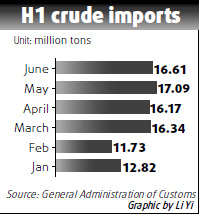China's oil imports grew marginally in the first half as the country's economy slowed, but may see further growth in the second half as demand improves, said industry insiders.
The small growth in oil imports from January to June was largely due to the weak domestic demand. However, oil imports are set to rebound in the second half, said Liu Gu, analyst with Guotai Jun'an Securities in Shenzhen.
However, she pointed out that the revival might not be too

fast. "We expect oil imports will see a 1-percent year-on-year growth in 2009."
China imported 90.77 million tons of crude oil in the first half, a 0.3-percent growth year-on-year, according to General Administration of Customs. The country imported 179 million tons of crude in 2008, up 9.6 percent from a year earlier.
China produced 93.49 million tons of crude in the first half, down 1 percent from a year earlier. The country processed 175.13 million tons of crude in the period, an increase of 1.5 percent year-on-year, according to the National Development and Reform Commission (NDRC).
Oil imports in the second half will see more solid growth, compared to the imports in the second half of 2008 which declined sharply due to the global financial crisis, said Lin Boqiang, director of the China Center for Energy Economics Research at Xiamen University.
It is also important to note that oil imports have already seen month-on-month recovery, said Lin. China imported 17.09 million tons of crude oil in May, the highest this year. The figure saw year-on-year growth of 5.5 percent and month-on-month growth of 5.7 percent.
However, in the first quarter, China's oil imports dropped by 10.2 percent from the same period last year.
"In my opinion, this year's oil imports may see a 2-percent growth," said Lin.
He said that although China is paying increasing attention to oil reserves, it has a small impact on oil imports, as the volume of oil reserves is relatively small.
Echoing Lin's views, Liu Gu said the combined capacity of China's strategic oil reserves and domestic enterprises' commercial reserves is only equal to 40 days of oil imports, so it would do little to oil imports in the full year.
Before 1993 China's oil production was enough to meet domestic demands. However, last year nearly half of the country's oil consumption was reliant on imports.
By becoming a net oil importer 15 years ago, China's fuel imports has seen accelerated growth in the past years. In 2004 the figure surpassed 100 million tons, up by 35 percent from a year earlier.
Analysts said that there is no doubt that China's oil import will continue to see rapid increase in the long term. According to a recent report by Chinese Academy of Social Sciences (CASS), 64.5 percent of the country's oil consumption is likely to be met by imports in 2020.
The gap between domestic consumption and production is the main cause for the increase in imports. Statistics with CASS showed that China's oil production is expected to reach 177 to 198 million tons in 2010, and the figure would reach 182 to 200 million tons in 2015.
China's oil production will see gradual decline after 2020, said CASS.
Analysts said that China should further diversify its oil importing sources to ensure sustainable supplies. At present the Middle East, Africa and Asia-Pacific are the three main regions for Chinese oil imports.
(China Daily July 31, 2009)